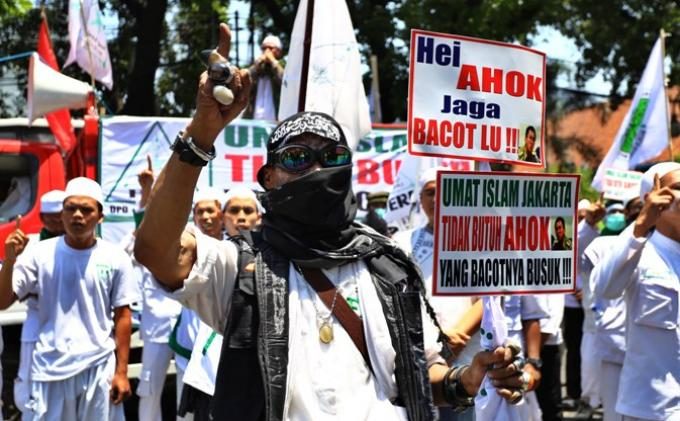The angry protests against Ahok weren’t about his race. Instead they were aimed at bringing him down for his efforts against religious groups and their illegal cash flows, writes Russell Dunne. The question now is, can Jakarta’s governor survive in a gangster’s paradise?
The lack of love between Jakarta governor Basuki Tjahaja Purnama, or ‘Ahok’, and fundamentalist Islam is not news.
During the 2012 gubernatorial campaign Ahok was targeted in a smear campaign that attacked not only his Chinese ethnicity but also his Christian background. This is odd, because Christians in high places in Indonesia are not particularly unknown. In 1964 Sukarno installed the artist Henk Ngantung as governor of Jakarta. Ngantung like Ahok was both Christian and not from Jakarta. Suharto also promoted Benny Murdani a Christian from Central Java to run the Indonesian military.
Ahok’s race isn’t the issue for Islamic fundamentalist groups such as the Front Pembela Islam (FPI or Islamic Defenders Front). Instead they are targeting his religion. The Indonesian constitution is structured so that it is impossible for a non-Muslim to become president, meaning Ahok has risen as far as he is ever likely to go in Indonesian politics. Ahok who is known for his blunt language and inability to tolerate both the corrupt and the incompetent is being accused by his enemies of committing blasphemy against the Prophet Muhammad.
The fact that the FPI and other Islamist groups were able to organise a protest on 4 November that brought an estimated 200,000 people onto the streets of Central Jakarta decrying Ahok and his rumoured blasphemy is nothing short of amazing. This is even more so when it’s remembered that the protests when Ahok first became governor in 2014 drew less than 10,000 people.
Next year’s vote for Jakarta governor, and the promise of the presidency after that, also has a lot to do with the recent popular outpouring of outrage.
Ahok, along with Agus Yudhoyono, the son of former president Susilo Bambang Yudhoyono, is a candidate in the February 2017 gubernatorial elections. Yudhoyono, unlike Ahok is also almost certainly campaigning with an eye on securing candidacy for the 2019 presidential elections. Ethnic Chinese Christians from Jakarta visiting Australia over the weekend of November 5-8 told me that there is the understanding in Jakarta that the anti-Ahok rally was simply part of the process of politics.
There is clearly more to it than religion. In the past with President Joko ‘Jokowi’ Widodo as his immediate boss, Ahok has been a nuisance for certain elements in Indonesia. Until now Ahok has been protected. With the 2017 gubernatorial election in play that protection has been significantly reduced. In order to be seen as democratic Jokowi cannot overtly protect or favour his friend. The President has already indicated that he won’t “intervene” in the blasphemy probe.
Ahok has been busy as both a friend to ‘Jokowi’ and as a governor. He has cleaned out canals, which has limited the usual monsoon-related flooding of Jakarta. Ahok has also threatened to turn Jakarta’s red light district into a park. He has also continued Jokowi’s campaigns against corruption and has pursued the relocation of street markets into Tanah Abang, a modern market with an estimated $US 19 million per day turn over.
Between them, Ahok and Jokowi have been relocating street vendors into modern centralised and government supervised centres — centres that the Preman, members of Indonesia’s organised crime groups, don’t control. By relocating hawker stalls and street vendors into properly run and policed centres such as Tanah Abang, Ahok is effectively targeting the revenue stream of Preman groups such as the FPI and corrupt officials in local government.
The FPI have long been associated with gangsters. Greg Fealy and Sally White tell us in Expressing Islam: Religious Life and Politics in Indonesia, the FPI also engages in “morality racketeering”. As Ian Wilson notes, this sees the group use vigilantism and populist Islamic militancy to build and enforce a socially conservative agenda against the perceived liberal excesses and moral corruption of contemporary Indonesian society, while also capturing and keeping control of local neighbourhoods.
And this is the real reason why 200,000 people were on the streets of Jakarta on a sticky Friday afternoon. Ahok is being Ahok. He is being honest, blunt and effective. Ahok like Jokowi, the previous incumbent of his job, is enforcing laws. In being effective at his job Ahok is hitting the FPI and their Preman associates where it hurts them the most — in their wallets. If Ahok was either incompetent and or corrupt, the FPI and other Preman would be able to buy him off or dismiss him.
Because Ahok is popular, honest and effective, and as a result is affecting Preman-FPI cash flows, the FPI and Ahok’s political opponents have to find another tactic to prevent him from becoming governor in 2017. If the FPI announced that they were protesting against Ahok because he was hurting their cash flow no one would care. Ahok committing blasphemy and being an evil ‘kaffir’ is something that serious Muslims in Jakarta care about. It is literally the only way that Ahok as the effective governor that he is can be dealt with by his opponents.
We should expect to see more of this in the coming months.
Russell Dunne is studying for a Masters of International Relations at Monash University, and holds a specialist Indonesia BA and honours degree from the same university.
 Facebook
Facebook  Twitter
Twitter  Soundcloud
Soundcloud  Youtube
Youtube  Rss
Rss 